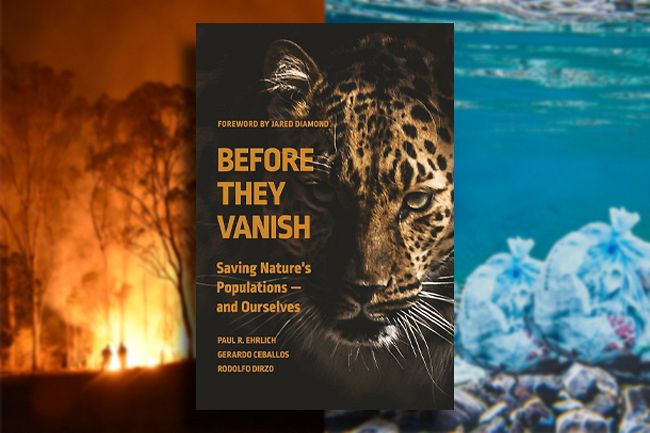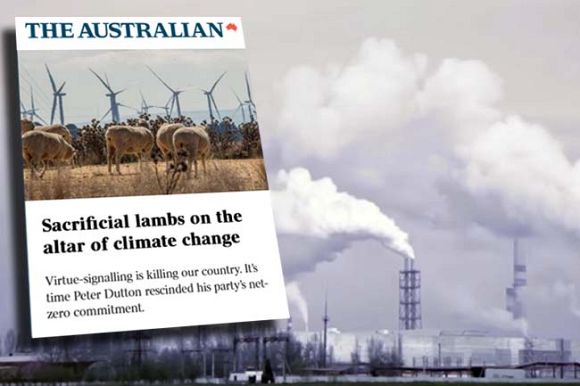One of the most powerful and important books on the global environmental crises humanity faces has just been released in Australia.
Before they vanish: Saving nature’s populations — and ourselves by Paul Ehrlich, Gerardo Ceballos and Rodolfo Dirzo, three eminent legendary scientists, is a critically important analysis and history of the planetary environmental wreckage created by humanity.
The book provides compelling evidence of an urgent need for governments and political parties to focus on our rapidly deteriorating life support systems.
The UN warns, ‘governments must have stronger political will to take action on climate change and avoid a “hell on earth” situation’ and the authors agree, painting a grim picture. Their writings encompass exponentially increasing global disasters interspersed with personal accounts.
Perhaps the book's most important chapter is focused on the drivers of extinction. The authors assert human population growth and the accompanying increase in humanity’s total consumption of resources are the root causes of the sixth mass extinction currently underway.
Some facts from the book follow:
The human population has grown so large that more than 40% of Earth’s land is now farmed to feed people.
Despite overpopulation being recognised as a major driver, the authors assert the issue is still largely ignored by policymakers. Given that every living being needs specific habitat requirements, all have been widely altered by the growth of human populations.
Detailing the fact that few species of wildlife can live on highways, vacant lots, strip malls, office buildings and sewers, the ongoing loss of habitat is creating major extinctions of plants and animals.
Overexploitation of living resources is happening at a rate that will eventually destroy them. For example, only about 2% of large marine fishes such as sharks and tuna now remain in the oceans compared to 1970.
Invasive alien species are estimated to be responsible for about half the cases of extinction or major decline. Among all bird species classified as threatened, 26% of threats are attributed to invasive species.
The gigantic loads of plastics that humanity dumps into the oceans might alter the basic properties of the ocean as the plastic is reduced to smaller and smaller particles forming a surface layer.
Estimates of the vast oceanic islands of plastic garbage are frightening. The Great Pacific Garbage Patch is thought to contain an area of 1.6 million square kilometres, about the size of Alaska. The authors say that soon, plastic trash will outweigh all the fishes in the sea.
The tiny fragments of plastic accumulate toxic chemicals resistant to environmental breakdown and enter the marine food chains, carrying the toxins back to us as we dine on plastic-laden seafood. The particles can damage human cells and become carriers of micro-organisms pathogenic to humans.
Another little-recognised environmental problem facing both people and wildlife is the increasing toxification of the entire planet with synthetic chemicals and rare earths.
Cosmetics, cleansing compounds, insecticides, medicines, herbicides, preservatives paint strippers, lubricants, drugs and industrial chemicals that mimic natural hormones are able to alter the development of young animals including human children with potentially catastrophic consequences.
No place on Earth can now be considered pristine.
Climate change impacts according to the authors are affecting myriads of populations of terrestrial, aquatic and marine species. The scientists write that no aspect of an organism’s environment is not influenced by climate change. Changes can happen so fast that many organisms cannot respond or cope, resulting in devastating consequences.
Australian environmental crises are recognised in the book. The authors note that almost 10 million acres of wildlands and rural areas burnt in New South Wales alone during the Black Summer bushfires. Millions of animals, birds and reptiles were killed.
The book recognises the loss of almost a third of the koala population in the state alone.
In an IA exclusive interview with Professors Ehrlich and Dirzo, the following observations on the Australian situation highlight the crises the continent faces.
Professor Dirzo said:
With its special biodiversity, reflected by the exuberance of a unique constellation of endemic plants and animals; its fascinating geological history; the confluence of some of the major ecosystems of the globe; and the traditional ecological knowledge of its ancestral Indigenous Peoples, the island-continent of Australia represents a veritable planetary treasure.
In addition, Australia boasts a community of some of the finest environmental scientists of the world — many of them my heroes. Regrettably and inexplicably, such invaluable natural and human capital lies at the mercy of inadequate policies that disavow the realities of climate change, land use change and resource overexploitation, in favour of unsatiable growth mania.
All of this is reflected in the catastrophic loss of countless populations of plants, animals and microbes that represent the life-supporting systems upon which Australian society ultimately depends. This book is an invitation to foster a biodiversity-informed society that demands that its leaders embrace a robust environmental agenda going forward.
Professor Ehrlich commented:
Australia has suffered extraordinary reductions in its mammalian and other biodiversity, as one would have expected from its unusual vulnerability. One of its major problems is that many of its ecologists are employed by states and state politicians who have censored them in order to protect the politicians who own them.
The situation is similar in the U.S. but there, many more ecologists are employed by universities and are freer from censorship. Both nations require very strong federal regulation and international cooperation to try to avoid a broad collapse.
With no single magic bullet cure, the authors suggest we must all change our behaviour in small and large ways.
In summing up some of the threats, the authors stress that most population extinction events are the result of the combined effects of multiple drivers.
Solutions suggested involve complex problems that are not easily addressed:
Every individual action will help undo the great harm that humanity has unleashed upon Earth. These changes are not just the least we can do, they are the least we must do.
We have the knowledge but what we lack is collective will.
As for saving ourselves the final words of the book make poignant reading.
‘The massive loss of populations and extinctions reflects our lack of empathy for all the wild species that have been our companions since our origins. In addition to threatening the existence of civilisation, allowing them to disappear in thrall to our own greed and short sightedness is just plain morally wrong.’
Before they vanish: Saving nature’s populations — and ourselves is published by John Hopkins University Press.
Sue Arnold is an IA columnist and freelance investigative journalist. You can follow Sue on Twitter @koalacrisis.
 This work is licensed under a Creative Commons Attribution-NonCommercial-NoDerivs 3.0 Australia License
This work is licensed under a Creative Commons Attribution-NonCommercial-NoDerivs 3.0 Australia License
Support independent journalism Subscribe to IA.

Related Articles
- Fight or flight: Adapting to the climate crisis
- Despite Monckton's climate denial, the world is still burning
- Labor and Coalition both ignore climate crisis
- Fishing industry facing pressure from climate crisis
- News Corp continues to endorse climate change nonsense















